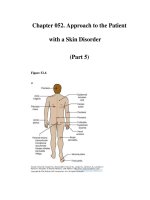Chapter 077. Approach to the Patient with Cancer (Part 6) pdf
Bạn đang xem bản rút gọn của tài liệu. Xem và tải ngay bản đầy đủ của tài liệu tại đây (14.55 KB, 5 trang )
Chapter 077. Approach to the
Patient with Cancer
(Part 6)
Tumor markers may be useful in patient management in certain tumors.
Response to therapy may be difficult to gauge with certainty. However, some
tumors produce or elicit the production of markers that can be measured in the
serum or urine and, in a particular patient, rising and falling levels of the marker
are usually associated with increasing or decreasing tumor burden, respectively.
Some clinically useful tumor markers are shown in Table 77-5. Tumor markers are
not in themselves specific enough to permit a diagnosis of malignancy to be made,
but once a malignancy has been diagnosed and shown to be associated with
elevated levels of a tumor marker, the marker can be used to assess response to
treatment.
Table 77-5 Tumor Markers
Tumor Markers Cancer Non-
Neoplastic
Conditions
Hormones
Human chorionic
gonadotropin
Gestational
trophoblastic disease,
gonadal germ cell tumor
Pregnancy
Calcitonin
Medullary cancer
of the thyroid
Catecholamines Pheochromocytoma
Oncofetal Antigens
Alphafetoprotein Hepatocellular
carcinoma, gonadal germ
Cirrhosis,
cell tumor hepatitis
Carcinoembryonic
antigen
Adenocarcinomas
of the colon, pancreas,
lung, breast, ovary
Pancreatitis,
hepatitis,
inflammatory bowel
disease, smoking
Enzymes
Prostatic acid
phosphatase
Prostate cancer Prostatitis,
prostatic
hypertrophy
Neuron-specific
enolase
Small cell cancer of
the lung,neuroblastoma
Lactate
dehydrogenase
Lymphoma,
Ewing's sarcoma
Hepatitis,
hemolytic anemia,
many others
Tumor-Associated Proteins
Prostate-specific
antigen
Prostate cancer Prostatitis,
prostatic
hypertrophy
Monoclonal
immunoglobulin
Myeloma Infection,
MGUS
a
CA-125
Ovarian cancer,
some lymphomas
Menstruation,
peritonitis,
pregnancy
CA 19-9 Co
lon, pancreatic,
breast cancer
Pancreatitis,
ulcerative colitis
CD30
Hodgkin's disease,
anaplastic large cell
lymphoma
—
CD25
Hairy cell
—
leukemia, adult T cell
leukemia/lymphoma
a
MGUS, monoclonal gammopathy of uncertain significance.









